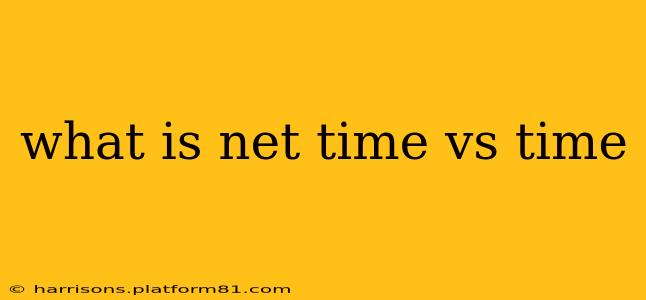Net Time vs. Time: Understanding the Difference
The terms "net time" and "time" are often used interchangeably, leading to confusion. However, they represent distinct concepts, particularly in contexts like project management, scheduling, and productivity tracking. Understanding the difference is crucial for accurate planning and efficient time management. This article will clarify the distinction and explore common scenarios where these terms are used.
What is "Time"?
In its broadest sense, "time" refers to the total duration of an activity or period. This is the raw, unadjusted measure of how long something takes. For example, if a meeting lasts for 60 minutes, its "time" is 60 minutes. This is the duration you see on your calendar or clock.
What is "Net Time"?
"Net time," on the other hand, represents the actual time spent working on a specific task or activity, excluding any interruptions, breaks, or downtime. It's the productive, focused time dedicated solely to the task at hand. Using the meeting example, if the 60-minute meeting included 10 minutes of chatter unrelated to the agenda, the net time spent on the meeting's core purpose would be 50 minutes.
How Do Net Time and Time Differ in Practice?
The difference between net time and time becomes particularly apparent in scenarios involving:
-
Project Management: In project timelines, "time" might encompass the total allocated duration, while "net time" focuses on the actual work hours invested in completing specific project phases. This distinction helps in identifying inefficiencies and improving future estimations.
-
Productivity Tracking: Tracking net time allows for a more accurate assessment of personal or team productivity. By subtracting non-productive time, you gain a clearer understanding of how effectively time is being utilized.
-
Work Scheduling: When creating work schedules, accounting for net time ensures realistic task completion deadlines. Factoring in breaks, meetings, and other interruptions provides a more accurate picture of how much actual work time is available.
-
Data Analysis: When analyzing data, net time allows researchers to isolate the impact of the measured activity without the confounding effects of extraneous factors.
What are the benefits of tracking net time?
Tracking net time offers numerous benefits:
-
Improved Time Management: By understanding how much time is truly spent on tasks, individuals and teams can identify time-wasting activities and implement strategies for improved efficiency.
-
More Accurate Project Planning: Realistic project timelines are built on an accurate understanding of net time required for each task, rather than solely on total allocated time.
-
Enhanced Productivity: Focusing on maximizing net time encourages more focused work and minimizes distractions.
-
Better Resource Allocation: Accurate net time tracking allows for better allocation of resources, both human and material.
How to Calculate Net Time
Calculating net time involves subtracting all non-productive time from the total time spent on an activity. This requires diligent tracking of interruptions and breaks. Tools like time tracking software or even simple spreadsheets can be helpful for this process.
People Also Ask: Frequently Asked Questions
Q: Is net time the same as billable hours?
A: Not necessarily. Billable hours are typically the hours a client is charged for, which may or may not align perfectly with net time. Some billable hours might include time spent on administrative tasks not directly related to the core project work.
Q: How can I improve my net time?
A: Improving net time involves strategies like minimizing distractions, prioritizing tasks, using time-blocking techniques, and regularly reviewing your time usage to identify areas for improvement.
Q: Why is understanding net time important for businesses?
A: For businesses, understanding net time is crucial for accurate project costing, resource allocation, and productivity measurement, leading to improved profitability and efficiency.
Q: What software can help me track net time?
A: Various software options, such as Toggl Track, Clockify, and RescueTime, are available to help track net time.
By understanding the difference between net time and total time, you can significantly improve your time management, project planning, and overall productivity. Focusing on maximizing net time is a key to achieving greater efficiency and success.
